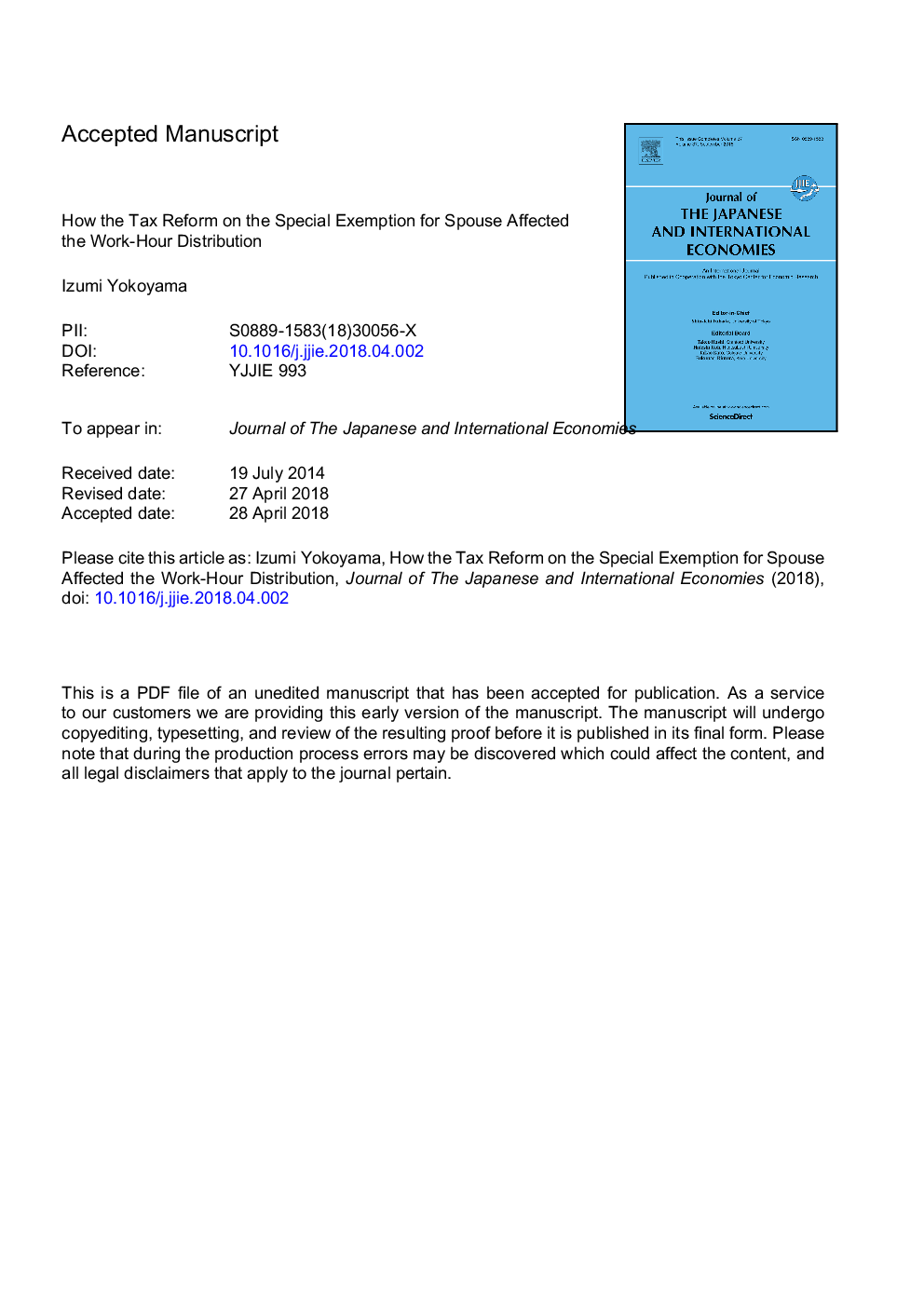| کد مقاله | کد نشریه | سال انتشار | مقاله انگلیسی | نسخه تمام متن |
|---|---|---|---|---|
| 8954596 | 1646023 | 2018 | 19 صفحه PDF | دانلود رایگان |
عنوان انگلیسی مقاله ISI
How the tax reform on the special exemption for spouse affected the work-hour distribution
ترجمه فارسی عنوان
چگونگی اصلاح مالیات بر معافیت ویژه برای همسر، توزیع ساعت کاری را تحت تاثیر قرار داد
دانلود مقاله + سفارش ترجمه
دانلود مقاله ISI انگلیسی
رایگان برای ایرانیان
کلمات کلیدی
ترجمه چکیده
ژاپن دارای یک سیستم معافیت ازدواج است که در آن درآمد معافیت درآمد شوهر می تواند به دلیل افزایش درآمد همسرش کاهش یابد. بخشی از این معافیت در سال 2004 لغو شد تا نیروی کار زنان متاهل کم درآمد را افزایش دهد. در این مطالعه، بررسی می کنم که چگونه اصلاحات مالیاتی در سال 2004 در ژاپن توزیع روزهای تعطیلات زنان متاهل را تحت تاثیر قرار داد. این اصلاحات، یک خط جدید را در 1.05 میلیون ین در خط بودجه ایجاد کرد که آستانه درآمد متعارف حدود 1 میلیون ین را بیشتر آشکار کرد. اولا، من به لحاظ تئوری نشان می دهم که این تغییر در شکل خط بودجه به دلیل اصلاحات مالیاتی، حتی ممکن است زنان همجنسگرا و متوسط را که اصلا تحت تاثیر اصلاحات مالیاتی قرار نگرفته اند، تحت تأثیر قرار دهد. بطور دقیق، تحت شرایط خاصی، مواردی وجود دارد که برخی از خانوارهای متوسط و با درآمد بالا درآمد خود را به درستی زیر آستانه معمولی کاهش می دهند زمانی که آنها شوک های خارجی را تجربه می کنند که می تواند آنها را از ساعت های کاری دور نگه دارد. روش های تجزیه نسبتا جدید، و همچنین تخمین های تفاوت بین دو تفاوت در هر دو، همه را تایید می کند که اصلاح مالیات ساعت کار را در میان زنان متاهل کم درآمد افزایش داد. علاوه بر این، برخی از زنان متاهل متوسط و با درآمد بالا درآمد خود را به میزان کم درآمد متعارف در پاسخ به افزایش درآمد شوهرشان پس از اصلاحات مالیاتی کاهش می دهند. این شواهد نشان می دهد که این رفتار همسران متوسط و با درآمد بالا ممکن است به دلیل افزایش آگاهی از آستانه درآمد متعارف باشد. این همچنین اهمیت دانستن و درک تاثیر بالقوه اصلاحات مالیاتی را به کسانی که اهداف آن نیست و همچنین شرایطی که درآمد ناگهانی در میان زنان وارثان متوسط و با درآمد بالا رخ می دهد، نشان می دهد.
موضوعات مرتبط
علوم انسانی و اجتماعی
اقتصاد، اقتصادسنجی و امور مالی
اقتصاد و اقتصادسنجی
چکیده انگلیسی
Japan has a spousal exemption system in which the income exemption a husband can claim decreases as his spouse's income increases. Part of this exemption was abolished in 2004 to boost the labor supply of low-income married women. In this study, I examine how the 2004 tax reform in Japan affected the work-hour distribution of married women. The reform created a new kink at 1.05 million yen on the budget line, which made the conventional income threshold of around 1 million yen more evident. First, I theoretically show that this change in the shape of the budget line due to the tax reform could influence even medium- to high-income wives presumed to be unaffected by the tax reform. More concretely, under certain conditions, there are cases in which some medium- to high-income wives reduce their income to just below the conventional threshold when they experience some exogenous shocks that could discourage them from working long hours. Relatively new decomposition methods, as well as quantile difference-in-differences estimations, all confirm that the tax reform increased the work hours among low-income married women. In addition, some medium- to high-income married women greatly reduced their income to just below the conventional income threshold in response to an increase in their husbands' income after the tax reform. This evidence indicates that this behavior of medium- to high-income wives could be due to an enhanced awareness of the conventional income thresholds. It also implies the importance of knowing and understanding the potential impact of the tax reform on those who are not the target of it, as well as the conditions under which the discontinuous income drop among medium- to high-income wives is likely to occur.
ناشر
Database: Elsevier - ScienceDirect (ساینس دایرکت)
Journal: Journal of the Japanese and International Economies - Volume 49, September 2018, Pages 69-84
Journal: Journal of the Japanese and International Economies - Volume 49, September 2018, Pages 69-84
نویسندگان
Izumi Yokoyama,
